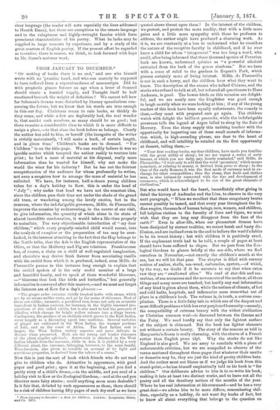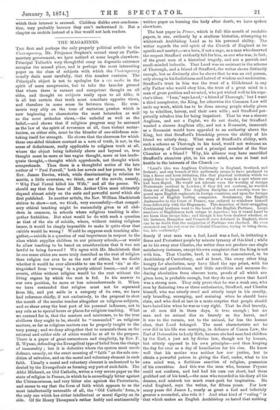FROM JANUARY TO DECEMBER.* "OF making of books there is
no end," said one who himself wrote with no 'prentice hand, and who can scarcely be supposed to have suffered from a superabundance of manuscripts. Did he with prophetic glance foresee an age when a fever of demand should create a hurried supply, and Thought itself be half smothered beneath the weight of definition ? We cannot tell how far Solomon's dreams were disturbed by literary speculations con- cerning the future, but we know that his words are true enough in this our day. Christmas seems to rain books, so thickly do they come, and while a few are deplorably bad, the real wonder
is, that amidst such numbers, so many should be so good ; but there remains a considerable class to which it is more difficult to assign a place,—to that class the book before us belongs. Clearly
the author has said to him, or herself (the incognito of the writer is strictly maintained), 'I will make a book, of certain length, and in given time.' Children's books are in demand. "For Children" is on the title-page. We can readily believe it was no ignoble motive which tempted the author rashly to venture into print ; he had a mass of material at his disposal, really more information than he wanted for himself, why not make the world the wiser for his industry? But he has not the faintest comprehension of the audience for whom professedly he writes, not even a suspkion how to arrange the mass of material he has collected. We have, for instance, half-a-dozen young children
taken for a day's holiday to Kew, this is under the head of 4' July " ; why under that head we have not the remotest idea, since the children pass their time not under the shade of the grand
old trees, or wandering among the lovely exotics, but in the museum, where the indefatigable governess, Mdlle. de Florenville, improves the occasion by endeavouring, in the course of one visit, to give information, the quantity of which alone in its state of almost incredible condensation, it would take a life-time properly to assimilate. The very objectionable introduction of "my dear children," which every properly-minded child would resent, into the analysis of camphor or the preparation of tea may be over- looked, in the interest attaching to the fact that the Hop belongs to the Nettle tribe, that the Ash is the English representative of the
Olive, or that the Mulberry and Fig are relations. Frankincense has, of course, a claim on a child of well-regulated imagination, and chocolate may derive fresh flavour from associating vanilla with the orchid from which it is produced, indeed, even Mdlle. de Florenville pauses in this instance long enough to explain that the orchid spoken of is the only useful member of a large and beautiful family, and to speak of those wonderful blossoms, —" blossoms that look like birds and butterflies," but generally information is conveyed after this manner,—and we must not forget the listeners are at Kew for a day's pleasure :— "The ginger order contains chiefly tropical herbs with stems, which are by no means unlike roots, and go by the name of rhizomes. Most of these are edible; turmeric, a powdered root, forms not only an aromatic ingredient in Indian cookery, for instance, in the highly seasoned pre- parations of rico called currie, but is also used to test the presence of alkalies, which change its bright yellow colours into a dingy brown. Cardamoms, the produce of an elettaria which grows in the East Indies, enter largely as a flavouring agent into medicine. Several varieties of ginger are cultivated in the West Indies, the warmer portions of Asia, and on the coast of Africa. The East Indian sort is larger, the West Indian variety superior and more delicate in flavour when preserved. Both are the young and tender rhizomes of the plant zingiber Vieinale. Arrow-root is obtained in the West Indian islands from the maranta, while in Asia it is yielded by a very different plant, the curcuma, belonging, however, to the same family. Tous-les-mois, also given to invalids on account or its light and nutritious properties, is derived from the tubars of a canna."
Now this is just the sort of book which friends who do not read give to children who do. Attractive in appearance, with good paper and good print ; open it at the beginning, and you find a pretty story of a child's dream,—in the middle, and you read of a holiday visit to Kew or the Zoological Gardens,—and at the end you discover more fairy stories ; could anything seem more desirable ? Is it fair that, deluded by such appearances as these, there should
be a risk of children having fifty pages of such dry stuff as we have • From January le December : a Book for Children. London: Longmans, Green, said Co. 1873.
quoted above thrust upon them ? In the interest of the children, we protest, and protest the more readily, that with a little more
pains and a little more sympathy with those he professes to address, the author might have produced a charming work. As
it is, we are constantly at a loss to understand what he considers the nature of the receptive faculty in childhood, and if he ever knew a child for whom " integument " was to long a word, who could, after being informed that three thousand species of Peruvian bark are known, understand quinine as "a powerful alkaloid extracted from the bark of the genus cinchona." But we turn with a sense of relief to the gardens in Regent's Park, which possess certainly more of living interest. Mdlle. de Florenville is not in such a hurry, and the children hear what they want to know. The description of the cranes who talked Chinese, and the storks who refused to talk at all, but referred all questioners to Hans Andersen, is good. The bower-birds on this occasion are delight- ful, and we are nearly sure the kingfisher was good enough to laugh merrily when we were looking at him; if any of the young readers of this book have been equally unfortunate, the remedy is clear,—they must with prepared ears go again. The children watch with delight the brilliant peacocks, while the indefatigable governess tells the legend of Argus lulled to sleep by the flute of Mercury. Even the sheep supply this untiring teacher with the opportunity for imparting one of those small morsels of informa- tion which, in high-sounding phrase, are dear to the heart of childhood, and will infallibly be retailed on the first opportunity at dessert, telling them,—
" Your first reading-books, my dear children, have made you familiar with the great utility of sheep ; let me not repeat a series of early lessons, of which you are daily, nay, hourly reminded," said Mdlle. de Florenville; "I wish only to add that the word pecuniary,' which means monetary, or relating to money, is derived from pecus or sheep : in tho time of the early Romans it was the first mode of currency used in ex- change for other commodities ; thus the sheep, that feeds and clothes man, is also intimately connected with the rise and development of commerce, which is acknowledged to be one of the great elements of civilisation."
But who would have had the heart, immediately after giving in
detail the history of Androcles and the Lion, to observe in the very next paragraph, "When we recollect that these sanguinary brutes
cannot possibly be tamed, and that every year throughout the In- dian empire, thousands of human beings, men, women, and children, fall helpless victims to the ferocity of lions and tigers, we must wish that they ere long may disappear from the face of the earth ?" Even in after-life, when our pleasantest dreams have been dissipated by sterner realities, we resent harsh and hasty dis- illusion, and are inclined even to the end to believe the world's fables
to be its truest history ; but with children it is positively cruel. If the unpleasant truth had to be told, a couple of pages at least should have been suffered to elapse. But we pass from the Zoo- logical Gardens to glance briefly at the sea-side, where we find
ourselves in November,—not exactly the children's month at the sea, but we will let that pass. The chapter is filled with cursory notices of amber, shells, sea-weed, carbuncles, oysters,—of which, by the way, we doubt if it be accurate to say that when eaten raw they are "swallowed alive." We read of star-fish and sea- urchins, of sea-anemones and the movements of the medium, all these things and many more are touched, but hardly any real information of any kind is given about them, while the notices of climate, of hot and cold baths, hospitals, and infirmaries seem somewhat out of place in a children's book. The volume is, in truth, a curious com- pilation. There is a little fairy tale in which one of the deepest and most difficult problems which has ever perplexed humanity—namely, the compatibility of extreme luxury with the widest civilisation or Christian common weal—is discussed between the Gnome and the Fairy. We need hardly say that only the lightest surface of the subject is skimmed. But the book has lighter elements not without a certain beauty. The story of the seasons as told in Marguerite's dream is really charming, with the charm of a French rather than English prose idyl. Why the storks do not like England is also good. We are sorry to conclude with a piece of unfavourable criticism, but we are compelled to observe of the
verses scattered throughout these pages that whatever their merits or demerits may be, they are just the kind of poetry children hate.
And the author must not blame us if we judge his book from this stand-point,—he has himself emphatically told us his book is "for children." Our deliberate advice to him is to re-write his book, making it into at least two distinct works, and to leave out all the poetry and all the desultory notices of the months of the year.
Where he has real information at his command—and he has a very great deal—we advise him to be more diffuse, remembering chil- dren, especially on a holiday, do not want dry husks of fact, but to know all about everything that belongs to the question on which their interest is aroused. Children dislike over-condensa- tion, very probably because they can't understand it. But a 'chapter on orchids instead of a line would not lack readers.











































 Previous page
Previous page